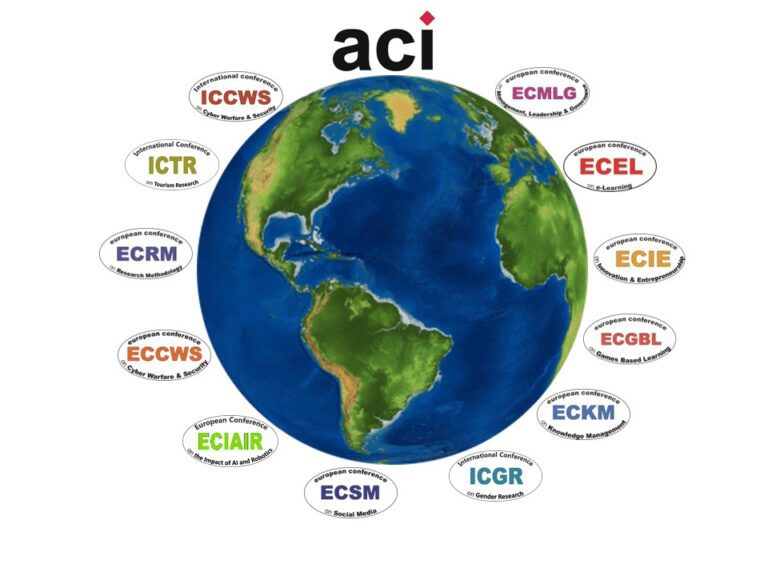Call for Papers

- Academic Papers
- Case Studies
- Work in-Progress Papers
- PhD Papers
- Masters Papers
- Posters and Presentations
- Non- Academic or Practitioner Contributions
Aims and Scope
The International Conference on Gender Research (ICGR) brings together scholars, practitioners, and researchers from around the world to explore diverse issues related to gender. This conference provides a multidisciplinary platform where participants are encouraged to engage in discussions and present research findings on various aspects of gender studies. The diversity of the research discussed, and the participants involved in the event is an important reflection on how Gender Studies still impact all corners of life. The published open access conference proceedings from these events serve as a valuable resource for ongoing research and scholarship in the area of gender research. Previous editions of the proceedings can be found here: https://papers.academic-conferences.org/index.php/icgr
Topics Covered
The call for papers for the ICGR conference asked for contributions that considered the following aims and scope. In addition to this, the committee welcomed papers on a number of specialist mini-tracks which can be seen at the end of this list.
Gender Identity and Expression
- the experiences and challenges faced by transgender and non-binary individuals
- social, legal, and psychological aspects of gender identity
- gender beyond the traditional binary framework.
Gender and Education
- the role of gender in educational settings
- gender disparities in access to education
- gendered experiences in classrooms
- the impact of educational policies on gender equality. It also delves into
- how gender influences academic and career choices, particularly in STEM fields.
Gender and Work
- the intersection of gender and work
- gender wage gaps and workplace discrimination
- the representation of women and gender minorities in leadership roles
- challenges of work-life balance
- the impact of gendered expectations on career advancement
- the role of organizations in promoting gender equity.
Gender and Health
- health disparities related to gender
- reproductive rights
- access to healthcare and mental health issues specific to different genders
- the impact of gender on health outcomes
- the influence of gender on health behaviour, access to services, and medical research
Gender, Politics, and Law
- the intersection of gender with politics and law
- examining gender representation in political institutions
- the impact of gender on voting behavior
- the role of gender in legal systems
- gender-based violence, legal protections against discrimination, and the impact of public policy on gender equality.
Cultural and Media Representations of Gender
- how gender is represented in various forms of media and culture.
- the analysis of gender stereotypes in television, film, literature, and advertising,
- the role of social media in shaping and challenging these representations.
- the impact of media on public perceptions of gender
- the role of cultural narratives in reinforcing or challenging gender norms.
Intersectionality
- how gender intersects with other social categories such as race, class, ethnicity, sexuality, and disability.
- the complexities of gender experiences and the multiple forms of discrimination and privilege that individuals may encounter.
Gender and Technology
- the role of technology in shaping gender experiences.
- the gendered dimensions of digital spaces,
- the impact of artificial intelligence on gender equity
- the challenges and opportunities that technology presents for advancing gender rights.
Gender in Global and Comparative Contexts
- comparative studies of gender across different countries and cultures,
- global variations in gender norms, policies, and practices.
- The impact of globalization on gender roles and how transnational movements can challenge traditional gender norms.
Mini Tracks
Gender Challenges in AI and XR: From Stereotypes and Harassment to Equity and Agency
Mini Track Chairs: Prof. Dr. Claudia Hess & Prof. Dr. Sibylle Kunz, IU International University of Applied Sciences
Building on the discussions and insights from the first minitrack on “Gender Challenges in AI and XR” at ICGR 2024, this second edition explores both ongoing and emerging gender-related challenges in Artificial Intelligence (AI) and Extended Reality (XR). Over the past year, rapid advances have introduced new opportunities and risks. Recent headlines remind us of the persistent dangers: bias in large language models, deepfakes, gender disparities in health diagnostic algorithms, inequities in facial and voice recognition systems, and virtual harassment in XR-based environments. Addressing gender issues in AI and XR solutions is critical, because these technologies influence societal norms and decision-making processes, and impact equality and fairness. While noteworthy research, regulatory, and community efforts are attempting to advance gender equity in AI and XR, progress over the past year has been mixed. Setbacks in organizational diversity, ethics budgets, and the slow roll-out of robust protective measures have marked 2024/25. Many gender-diversity advocacy initiatives have faced retrenchment due to shifting political and corporate priorities. Nonetheless, early harassment detection tools are being tested, and regulations like the EU AI Act are introducing broader requirements for transparency, human oversight, and anti-discrimination. However, these regulations still have to prove themselves. This mini track critically examines both the achievements and persistent gaps in addressing gender-related risks as these technologies continue to evolve. It aims to understand the underlying causes and manifestations and to create solutions by developing technological innovations, legal/regulatory/ethical frameworks and organizational practices. Suggested topics:
- Societal implications of gender-bias in AI or XR solutions
- Detecting, measuring and auditing gender bias in AI or XR
- Psychological and social benefits of avatar-based exploration of identity (e.g., for LGBTQ+ individuals)
- Safe spaces: Addressing risks of sexual misconduct and harassment, including challenges arising from mismatches between avatar appearance and real gender (e.g., concerning child protection)
- Effectiveness, adoption, and limitations of new technical and design countermeasures (such as inclusive datasets, bias mitigation, real-time moderation tools)
- Impact and gaps of existing and proposed regulations, voluntary codes of conduct and platform policies on gender bias in AI/XR
Gender in Research Performing Organizations
Mini Track Chairs: Dr. Sílvia Donoso López, Institute of Marine Sciences, Barcelona, Spain and María Gracia Puga, Barcelona Supercomputing Center, Barcelona, Spain
Gender equality and gender mainstreaming in research have long been priorities of the European Research Area (ERA). To drive institutional change, the ERA focuses on three main objectives: ensuring gender equality across all career stages, achieving gender balance in decision-making bodies and integrating the gender dimension into research and innovation content. Research-performing and funding organizations are strongly encouraged to adopt Gender Equality Plans (GEPs). These plans offer a structured framework for implementing institutional reforms and have proven highly effective in many RPOs, catalysing lasting change. Moreover, GEPs have become a mandatory eligibility criterion for RPOs seeking Horizon Europe funding. The aim of this mini-track is to share best practices and lessons learned from implementing GEPs across any of their priority thematic areas and through methodologies, strategies, measures, etc. innovative. Potential topics include, but are not limited to:
- work-life balance and organisational culture
- gender balance in leadership and decision-making
- gender equality in recruitment and career progression
- integration of the gender dimension into research and teaching content
- measures against gender-based violence including sexual harassment
- Institutional governance and accountability mechanisms
- Strategies for fostering inclusive research cultures
- Collaborative approaches and cross-institutional partnership
We welcome contributions that highlight practical experiences, innovative methodologies and measurable outcomes in advancing gender equality through GEPs.
Labour Markets and Gender Disparities: Causes, consequences and state policies.
Mini Track Chair: Prof. Ewa Lechman, Gdańsk University of Technology, Fahrenheit Universities, Poland
Persistent gender inequalities massively shape labour markets globally. From occupational segregation and unequal wages to disproportionate part-time or precarious employment, women and gender minorities often face multiple barriers limiting their economic opportunities, which in turn leads to financial discrimination and feminization of poverty. These inequalities are deeply rooted in cultural norms and attitudes, discriminating institutional practices promoting – although unofficially, traditional gender roles. This mini-track explores the drivers of labour market gender gaps, problems of unpaid labor force and feminization of poverty, childcare and pro-natal state policies and occupational segregation. It also offers some methodological considerations regarding labor market gender-related studies. By combining empirical research, comparative case studies, and policy evaluations, this track aims to foster a deeper understanding of the challenges and chart practical pathways toward more inclusive and equitable labor markets.
- Gender pay gap: (un)hidden drivers and economic consequences
- Occupational segregation: legal frameworks and state policies preventions
- Intersectionality in labour markets: tackling race and migration biases
- Dealing with unpaid workers issues – especially from developing countries perspectives
- Feminization of poverty
- Parental leave and childcare policies – equalizing opportunities in the labour market
- Methodological challenges in labour market gender-related studies
Identifying and Addressing Barriers to Conducting Feminist Research Concerning Women in Employment
Mini Track Chair: Dr Frances Hamilton, University of Reading
The goal of gender equality in employment remains high on the agenda of many international organisations, businesses and universities. International bodies such as the United Nations (Sustainable Development Goal 5) highlight the importance of gender parity on a global stage. Across the world different jurisdictions have taken multi-pronged approaches to tackle gender equality at work, with for example England and Wales introducing legislation prohibiting discrimination, introducing work-life balance rights, tax related incentives such as childcare vouchers, shared parental leave and gender pay gap reporting requirements. Yet a lack of gender equality in employment continues to exist in many countries worldwide. For example, the OECD records median gender pay gaps at 11.3% worldwide, 16% in the US and 14.5% in the UK (OECD, 2023). Inequalities between men and women and gender pay gaps are caused by multiple, complex and intersecting reasons and need continuous research and investigation. In this track we take the approach of researching the researchers, investigating the hypothesis that although there is a clear case for feminist research in this area, barriers continue to exist to conducting relevant research. This track serves to highlight the multi-pronged challenges faced.
- Challenges faced in conducting feminist research tackling inequality in employment
- Challenges faced in conducting participatory research studies
- Challenges faced in attracting employer participants
- Challenges faced when presenting the results of feminist research tackling inequality in employment
- Issues faced in implementing gender equality plans
- Strategies to attract participants and implement proposed action plans.
Storytelling for Gender Equality in the Post-Digital Era: Communicative and Educommunicative Practices Shaping Youth Narratives
Mini Track Chairs: dr. Isabel Palomo-Domínguez & dr. Rūta Tamošiūnaitė, Mykolas Romeris University, Lithuania
In a post digital era where digital and analogue media coexist in a blended fashion, new types of communication have become the central arena for negotiating gender meanings. Gen Z and Gen alpha inhabit this world of hybrid media and use creative storytelling as their primary mode of expression. They explore identity, challenge stereotypes and build inclusive imaginaries of gender using narrative that adapts across screens and physical world. Educommunication, as an interdisciplinary approach, merges critical reflection with active media practices, enabling youth not only to analyze content but to reshape it. Storytelling in this context functions as both a pedagogical tool and a cultural force, opening pathways for media literacy, creative self-expression, and social transformation. In both communication and educommunication, institutions and policymakers are helping cultivating equitable storytelling ecosystems that protect and amplify young voices. Informal and peer-driven storytelling, especially within influencer cultures, also acts as a powerful agent of cultural change, shaping gender norms from the ground up. This mini-track welcomes contributions that explore how hybrid storytelling practices, educommunication, and supportive institutional frameworks can advance gender equality and empower youth narratives in an era where digital and analogue worlds are inseparable.
- Educommunication for gender narratives: Empowering youth to critically engage and co-create inclusive stories.
- Institutional and policy responsibility: Supporting equitable storytelling and safeguarding youth expression.
- Hybrid storytelling practices: Blending digital dominance with analogue spaces to shape identities.
- Critical media literacy: Equipping youth to decode and rewrite biased narratives.
- Influencer and peer storytelling: Driving cultural change through networked narratives.
Submit your Abstract now!
Important Dates
| Abstract submission deadline | |
| Notification of abstract acceptance | 01 November 2025 |
| Full paper due for review | 07 December 2025 |
| Notification of paper acceptance (with any requested changes) | 15 February 2026 |
| Earlybird registration closes | 01 March 2026 |
| Final paper due (with any changes) | 15 March 2026 |
| Final Author payment date | 05 April 2026 |
Keynote Speakers

Perspektywy Education Foundation

Kozminski University

How we are Implementing an Inclusive Gender Equality Plan at University of Gdańsk

Why and When do Everybody (all genders) Profit from Gender Equality?.
Conference Contacts
| Academic Enquiries | Professor Dan Remenyi |
| Submission Enquiries | Pauline Philippe |
| Registration Enquiries | Belinda Burchell |
| Other Enquiries | Afua Bosompra |





